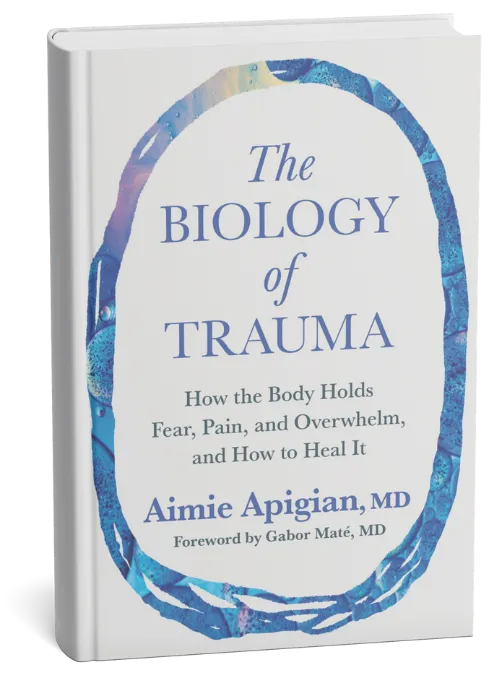
Stress In The Body: Trauma-Informed Medicine & Why Dysregulation Should Be Included In Assessments
Stress In The Body: Trauma-Informed Medicine & Why Dysregulation Should Be Included In Assessments
Why should medicine consider trauma as a diagnosis of inclusion and not just when nothing else is found wrong?
The failure to recognize and treat the stored trauma that drives many patients’ health challenges has profound and far-reaching consequences. It perpetuates a cycle of ineffective care. It worsens patient outcomes and undermines the overall effectiveness of the healthcare system. As a medical physician and also one who has been this type of patient, this episode and the Trauma-Informed Medicine Project coming out of this was really important to me.
One of the key problems is that trauma manifests in diverse ways across multiple bodily systems, making it difficult to identify as the common thread. Patients may present with a range of symptoms such as migraines, chronic pain, digestive issues, sleep problems, and mood disorders.
Rather than recognizing these as interconnected signs of nervous system dysregulation stemming from trauma, the medical system often compartmentalizes the symptoms, referring patients to various specialists to treat each one in isolation. This leads to a “medical merry-go-round” where patients bounce from one provider to the next, undergoing test after test, without ever getting to the root of their issues.
There is one more impact that makes this episode important. The absence of trauma-informed medicine causes patients’ symptoms to be minimized or dismissed. Sometimes patients are subjected to invasive medical procedures, actually breaking their trust in the system and their providers.
Addressing this and how to change it is the motivation for this episode.
Which is why I bring in Dr. Jorina Elbers, a board certified physician in neurology with a masters in epidemiology and former assistant professor and pediatric neurologist at Stanford University. She has authored over 25 research articles and book chapters, and really focuses on what’s going on in the nervous system in regard to stress and trauma and how to recognize it. She is currently the director of the Trauma Recovery Project at the Heart Math Institute and runs her own trauma sensitive neurology clinic.
In this episode, you will hear Dr. Elbers’ journey of how she discovered the critical link between trauma, stress, and neurological disorders. You will hear how she started asking better questions of her patients, uncovering stories of family trauma from her patients and just what to do especially when labs and tests show nothing wrong.
Helpful Links Related To This Episode
Related YouTube Videos:
3 Ways Our Childhood Shapes Our Nervous System
What You Need First Before Processing Your Childhood Trauma
How to Safely Process a Traumatized Child
Guides, Tools, Resources:
How To Identify And Heal Stored Trauma In The Body – free guide that will help you understand what trauma is, how to recognize it, and give simple steps to help you heal in this 23-page guide. It’s great for anyone who wants to understand trauma better or support others on their healing journey.
Guided Somatic Healing for Stored Emotions – if you know you have unresolved experiences from the past that you know you haven’t fully resolved, then I invite you to learn 7 somatic healing exercises for stored emotions in the body. These are safe for you to learn and do on your own, and it is where I would start, especially if you have any health symptoms that get triggered with stress or overwhelm. Again, it is guided somatic trauma exercises that you can safely learn and do on your own for the main emotions behind pain, fatigue, and other physical conditions.
Foundational Journey – if you are ready for the real transformation and ready to invest the time and money that is needed, it all starts with laying a foundation of regulation. This is a safely-guided 6-week journey into your inner world to address stored trauma in your body by learning how to create felt experiences of safety, support, joy and connection through somatic interventions and mind-body dialogues.
Connect with Dr. Jorina Elbers:
Related Podcasts:
Episode 92: How Chaos of Early Childhood Trauma Affects Our Adult Nervous System with Dr. Tian Dayton
Episode 74: Why Stored Trauma Becomes Syndromes & Somatic Solutions with Dr. Peter Levine
Episode 72: What We Have Missed With Trauma-Informed Care: Boundaries, Attachment and Generational Impact with Thomas Hübl
KEY MOMENTS:
[03:50] Asking better questions will help to uncover true causes behind inexplicable conditions
[10:45] Recognising trauma and the nervous system as a the main underlying condition
[14:30] Treating symptoms on a neurotransmitter level only is not the answer
[19:17] Working with patients whose medical symptoms are a protective mechanism
[22:00] How medical trauma contributes further to chronic symptoms and conditions
Disclaimer:
By listening to this podcast, you agree not to use this podcast as medical, psychological, or mental health advice to treat any medical or psychological condition in yourself or others. This podcast is for informational and educational purposes only and does not constitute professional advice, diagnosis, or treatment. Always consult your own physician, therapist, psychiatrist, or other qualified health provider regarding any physical or mental health issues you may be experiencing. This entire disclaimer also applies to any guests or contributors to the podcast. Under no circumstances shall Trauma Healing Accelerated, any guests or contributors to The Biology of Trauma® podcast, or any employees, associates, or affiliates of Trauma Healing Accelerated be responsible for damages arising from the use or misuse of the content provided in this podcast.
Comment Etiquette:
I would love to hear your thoughts on this episode! Please share your constructive feedback by using personal name or initials so that we can keep this space spam-free, and let’s keep the discussion positive!
Drop your thoughts below about the episode! I want to hear from you.
Connect with me on social media
Foundational Journey
You. Calm. Alive.
Be safely guided step-by-step through the essential process for addressing stored trauma in your body.
Disclaimer:
By listening to this podcast, you agree not to use this podcast as medical advice to treat any medical condition in either yourself or others. Consult your own physician for any medical issues that you may be having. This entire disclaimer also applies to any guests or contributors to the podcast. Under no circumstances shall Trauma Healing Accelerated, any guests or contributors to The Biology of Trauma podcast, or any employees, associates, or affiliates of Trauma Healing Accelerated be responsible for damages arising from the use of the podcast.

